Share
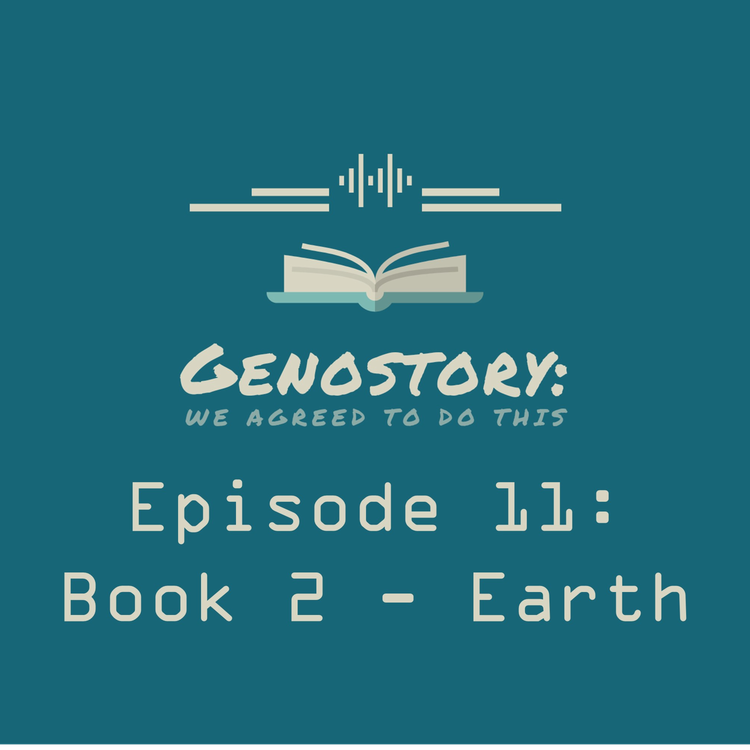
Genostory
Ep. 1.11 Book 2: Earth
Season 1, Ep. 11
•
Join historian John Lestrange for Episode 10 of Genostory: We Agreed to Do This, this month we'll be talking about season 2 of the show Avatat the Last Airbender and the depictions of genocide that can be found in it.
Also, as a reminder to everyone listening Black Lives Matter and All Cops are Bastards.
Special thanks to the app Hatchful and MJ Bradley for designing and editing out logo.
Show music is "Crusade - Heavy Industry by Kevin MacLeod (incompetech.com) Licensed under Creative Commons: By Attribution 4.0 License.
Sources:
The Avatar wiki
https://avatar.fandom.com/wiki/Avatar:_The_Last_Airbender
The Avatar IMDB Page
https://www.imdb.com/title/tt0417299/
More episodes
View all episodes
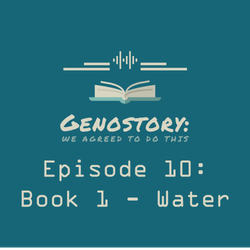
10. Episode 1.10:Book 1 - Water
56:04||Season 1, Ep. 10Join historian John Lestrange for Episode 10 of Genostory: We Agreed to Do This, this month we'll be talking about season 1 of the show Avatat the Last Airbender and the depictions of genocide that can be found in it.Also, as a reminder to everyone listening Black Lives Matter and All Cops are Bastards.Special thanks to the app Hatchful and MJ Bradley for designing and editing out logo.Show music is "Crusade - Heavy Industry by Kevin MacLeod (incompetech.com) Licensed under Creative Commons: By Attribution 4.0 License.Sources:The Avatar wikihttps://avatar.fandom.com/wiki/Avatar:_The_Last_AirbenderThe Avatar IMDB Pagehttps://www.imdb.com/title/tt0417299/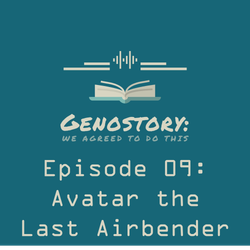
9. Episode 1.09: Avatar the Last Airbender
37:48||Season 1, Ep. 9Join historian John Lestrange and podcaster extraordinaire Frankie Bradley for Episode 9p of Genostory: We Agreed to do This. This month we'll be starting a new arc on the representation of genocide in cartoons by diving into Avatar the Last Airbender.Also, as a reminder to everyone listening Black Lives Matter and All Cops are Bastards.Special thanks to the app Hatchful and MJ Bradley for designing and editing out logo.Show music is "Crusade - Heavy Industry by Kevin MacLeod (incompetech.com) Licensed under Creative Commons: By Attribution 4.0 License.Sources:The Avatar wikihttps://avatar.fandom.com/wiki/Avatar:_The_Last_AirbenderThe Avatar IMDB Pagehttps://www.imdb.com/title/tt0417299/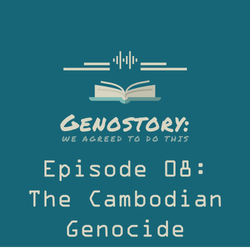
8. Episode 1.08: The Cambodian Genocide
32:28||Season 1, Ep. 8Join historian John Lestrange for Episode 8 of Genostory: We Agreed to do This. This month we'll be discussing a genocide that, too often gets overlooked, the Cambodian Genocide..Also, as a reminder to everyone listening Black Lives Matter and All Cops are Bastards.Special thanks to the app Hatchful and MJ Bradley for designing and editing out logo.Show music is "Crusade - Heavy Industry by Kevin MacLeod (incompetech.com) Licensed under Creative Commons: By Attribution 4.0 License.Sources:Heuveline, Patrick (2001). "The Demographic Analysis of Mortality Crises: The Case of Cambodia, 1970–1979". Forced Migration and Mortality. National Academies Press. pp. 102–105.Kiernan, Ben (2003). "The Demography of Genocide in Southeast Asia: The Death Tolls in Cambodia, 1975–79, and East Timor, 1975–80". Critical Asian Studies. 35 (4): 585–597.Locard, Henri (March 2005). "State Violence in Democratic Kampuchea (1975–1979) and Retribution (1979–2004)". European Review of History. 12 (1): 121–143Kiernan, Ben (October 2008). The Pol Pot Regime: Race, Power, and Genocide in Cambodia Under the Khmer Rouge, 1975-79. Yale University Press.Landsiedel, Peter, "The Killing Fields: Genocide in Cambodia", ‘’P&E World Tour’’, 27 March 2017.Mosyakov, Dmitry. "The Khmer Rouge and the Vietnamese Communists: A History of Their Relations as Told in the Soviet Archives". In Cook, Susan E., ed. (2004). "Genocide in Cambodia and Rwanda". Yale Genocide Studies Program Monograph Series. 1: 54.Valentino, Benjamin (2005). Final Solutions: Mass Killing and Genocide in the 20th Century. Cornell University Press. p. 84.William Branigin, Architect of Genocide Was Unrepentant to the End The Washington Post, 17 April 1998Gellately, Robert; Kiernan, Ben (2003). The Specter of Genocide: Mass Murder in Historical Perspective. Cambridge University Press.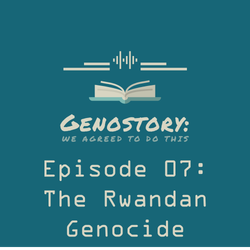
7. Ep. 1.07 The Rwandan Genocide
25:07||Season 1, Ep. 7Join historian John Lestrange for Episode 6 of Genostory: We Agreed to do This. This month we'll be discussing the most rapid and low tech of 20th century genocides, the Rwandan Genocide.Also, as a reminder to everyone listening Black Lives Matter and All Cops are BastardsSpecial thanks to the app Hatchful and MJ Bradley for designing and editing out logo.Show music is "Crusade - Heavy Industry by Kevin MacLeod (incompetech.com) Licensed under Creative Commons: By Attribution 4.0 License.Sources:Propaganda and Conflict: Evidence from the Rwandan Genocide by David Yanagizawa-Drott. The Quarterly Journal of Economics. August 2014Bystanders to Genocide: Why the US Let the Rwandan Tragedy Happen by Samantha Power. The Atlantic Monthly Sept 2001.Akhavan, Payam (1996). "The International Criminal Tribunal for Rwanda: The Politics and Pragmatics of Punishment". American Journal of International Law. 90 (3): 501–10.Aptel, Cicile (2008). "Closing the U.N. International Criminal Tribunal for Rwanda: Completion Strategy and Residual Issues". New England Journal of International and Comparative Law. 14 (2): 169–88.Dallaire, Roméo (2005). Shake Hands with the Devil: The Failure of Humanity in Rwanda. London: Arrow Books.Des Forges, Alison (1999). Leave None to Tell the Story: Genocide in Rwanda (Report). New York: Human Rights Watch.The Order of Genocide: The Dynamics of Genocide in Rwanda by Scott Straus Genocide Studies and Prevention: An International Journal. Vol 2. No 3. 2007.Totten, Samuel; Bartrop, Paul Robert; Jacobs, Steven L. (2008). Dictionary of Genocide, Volume 2: M–Z. Westport, CT: Greenwood Publishing Group.United Nations Department of Peacekeeping Operations (2008). "United Nations Peacekeeping Operations: Principles and Guidelines“Verwimp, Philip (2006). "Machetes and Firearms: The Organization of Massacres in Rwanda". Journal of Peace Research. 43 (1): 5–22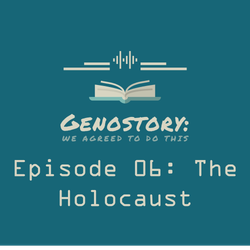
6. Ep. 1.06 The Holocaust
26:11||Season 1, Ep. 6Join historian John Lestrange for Episode 6 of Genostory: We Agreed to do This. This month we'll be discussing the most infamous of 20th century genocides, the Holocaust.Also, as a reminder to everyone listening Black Lives Matter and All Cops are BastardsSpecial thanks to the app Hatchful and MJ Bradley for designing and editing out logo.Show music is "Crusade - Heavy Industry by Kevin MacLeod (incompetech.com) Licensed under Creative Commons: By Attribution 4.0 License.Sources:The Treaty of Versailles https://www.loc.gov/law/help/us-treaties/bevans/m-ust000002-0043.pdf Steiner, John Michael (1976). Power Politics and Social Change in National Socialist Germany: A Process of Escalation into Mass Destruction. The Hague: Mouton. Kershaw, Ian (2008). Hitler: A Biography. New York: W. W. Norton & Company. Shirer, William L. (1960). The Rise and Fall of the Third Reich. New York: Simon & Schuster. Leonidas Hill (2001). "The Nazi Attack on 'Un-German' Literature, 1933-1945" IN: The Holocaust and the Book: Destruction and Preservation. Book Burning USHMM https://encyclopedia.ushmm.org/content/en/article/book-burning "Station 7: Courtyard and Bunker". Dachau Concentration Camp Memorial Site. http://www.kz-gedenkstaette-dachau.de/en/historical-site/virtual-tour/ History.com The Holocaust https://www.history.com/topics/world-war-ii/the-holocaust Goldhagen, Daniel (1996). Hitler's Willing Executioners: Ordinary Germans and the Holocaust. New York: Knopf. Longerich, Peter (2010). Holocaust: The Nazi Persecution and Murder of the Jews. Oxford; New York: Oxford University Press. Lifton, Robert J. (2000) [1986]. The Nazi Doctors: Medical Killing and the Psychology of Genocide (2000 ed.). New York: Basic Books. Auschwitz Memorial and Museum http://auschwitz.org/en/ Kubica, Helena (1998) [1994]. "The Crimes of Josef Mengele". In Gutman, Yisrael; Berenbaum, Michael (eds.). Anatomy of the Auschwitz Death Camp. Bloomington, Indiana: Indiana University Press. Holocaust Death Tolls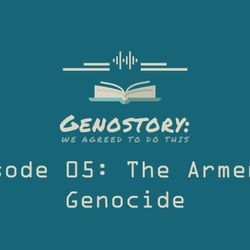
Ep. 1.05 The Armenian Genocide
35:21|Join historian John Lestrange for episode 5 of Genostory: We Agreed to Do This. In this episode John will go over the Armenian genocide and the historic contexts that allowed it to happen. Also, as a reminder to everyone listening Black Lives Matter and All Cops are Bastards Special thanks to the app Hatchful and MJ Bradley for designing and editing out logo. Show music is "Crusade - Heavy Industry by Kevin MacLeod (incompetech.com) Licensed under Creative Commons: By Attribution 4.0 License. Sources: Council of Europe Parliamentary Assembly Resolution 275. https://www.armenian-genocide.org/Affirmation.153/current_category.7/affirmation_detail.html Barsoumian, Hagop (1997), "The Eastern Question and the Tanzimat Era", in Hovannisian, Richard G (ed.), The Armenian People From Ancient to Modern Times, II: Foreign Dominion to Statehood: The Fifteenth Century to the Twentieth Century, New York: St. Martin’s, Dixon, Jeffrey S.; Sarkees, Meredith Reid (2015). A Guide to Intra-state Wars: An Examination of Civil, Regional, and Intercommunal Wars, 1816-2014. CQ Press. Akçam, Taner (2006). A Shameful Act: The Armenian Genocide and the Question of Turkish Responsibility. New York: Metropolitan Books. The Armenian Genocide: Context and Legacy by Doctor Rouben Adalian The Gardening States: Comparing State Repression of Ethnic Minorities in the Soviet Union and Turley, 1908 – 1945 by Duco Heija. Genocide Studies and Prevention: An International Journal. Vol 12. No 1. 2018 When Persecution Bleeds into Mass Murder: The Processive Nature of Genocide by Ugur U. Ungor. Genocide Studies and Prevention: An International Journal. Vol 1. No 2. 2006 Deportations and Massacres in the Cipher Telegrams of the Interior Ministry in the Prime Ministerial Archive (Basbakanlik Arsivi) by Taner Ackam. Genocide Studies and Prevention: An International Journal. Vol 1. No 3. 2006. Balakian, Peter (2003). The Burning Tigris: The Armenian Genocide and America's Response. New York: HarperCollins. "Exiled Armenians starve in the desert; Turks drive them like slaves, American committee hears ;- Treatment raises death rate". The New York Times. 8 August 1916. Dadrian, Vahakn (November 1991). "The Documentation of the World War I Armenian Massacres in the Proceedings of the Turkish Military Tribunal". International Journal of Middle East Studies. 23 (4): 549–76 (560). Charny, Israel W.; Tutu, Desmond; Wiesenthal, Simon (2000). Encyclopedia of genocide (Repr ed.). Oxford: ABC-Clio. p. 95 Kiernan, Ben (2007). Blood and Soil: A World History of Genocide and Extermination from Sparta to Darfur. Yale University Press. pp. 411 Vahakn N. Dadrian, The Role of Turkish Physicians in the World War I Genocide of Ottoman Armenians . The Holocaust and Genocide Studies 1, no. 2 (1986), pp. 177. Turkey's EU Minister, Judge Giovanni Bonello And the Armenian Genocide - ‘Claim about Malta Trials is nonsense’. The Malta Independent. "Erdogan: Turkey will 'never accept' genocide charges | DW | 04.06.2016". Deutsche Welle Akçam, Taner (4 September 2004). From Empire to Republic: Turkish Nationalism and the Armenian Genocide.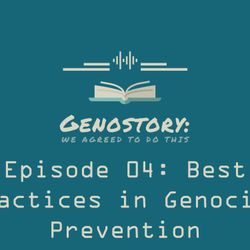
Ep. 1.04 Best Practices in Genocide Prevention
55:47|Join historian John Lestrange for episode 4 of Genostory: We Agreed to Do This. In this episode John will go over best practices in genocide prevention, why prevention is so difficult, and what you can do to aid in prevention efforts. Also, as a reminder to everyone listening Black Lives Matter and All Cops are Bastards Special thanks to the app Hatchful and MJ Bradley for designing and editing out logo. Show music is "Crusade - Heavy Industry by Kevin MacLeod (incompetech.com) Licensed under Creative Commons: By Attribution 4.0 License. Sources: No Lesson Learned From the Holocaust? Assessing Risks of Genocide and Political Mass Murder since 1955. Barbara Harff. American Political Science Review. Vol 97. No 1. 2003. Improving Intervention Decisions to Prevent Genocide: Less Muddle, More Structure. Robin Gregory. Genocide Studies and Prevention: An International Journal. Vol 11. No 3. 2018. Halting Genocide: Rhetoric vs. Reality. Thomas G. Weiss. Genocide Studies and Prevention: An International Journal. Vol 2. No 1. 2007. Naming Horror: Legal and Political Words for Mass Atrocities. Martha Minow. Genocide Studies and Prevention: An International Journal. Vol 2. No 1. 2007 Churchill in Munich: The Paradox of Genocide Prevention. Robert Melson. Genocide Studies and Prevention: An International Journal. Vol 3. No 3. 2008. Preventing Genocide: A Blueprint for US Policymakers. Madeline Albright and William Cohen. December 8, 2008. The Albright-Cohen Report: From Realpolitik Fantasies to Realist Ethics. Henry C. Theriault. Genocide Studies and Prevention: An International Journal. Vol 4. No 2. 2009. MARO: Mass Atrocity Response Operations. Sally Sewall, Dwight Raymond, Sally Chin. The Carr Center for Human Rights Policy. 2010. The MARO Handbook: New Possibilities or the Same Old Militarism. Henry Theriault. Genocide Studies and Prevention: An International Journal. Vol 6. No 1. 2011. The UN Secretary-General’s Human Rights Up Front Initiative and the Prevention of Genocide: Impact, Potential, Limitations. Ekkehard Strauss. Genocide Studies and Prevention: An International Journal. Vol 11. No 3. 2018 The African Standby Force: Genocide and International Relations Theory. Stephen Burgess. Genocide Studies and Prevention: An International Journal. Vol 6. No 2. 2011. US Military Spending By Year. https://www.statista.com/statistics/272473/us-military-spending-from-2000-to-2012/ Turning Atrocity Prevention Inside out: Community Based Approaches to Preventing, Protecting, and Recovering from Mass Violence. Bridget Moix. Genocide Studies and Prevention: An International Journal. Vol 9. No 3. 2016. Anderson, Mary B., and Marshall Wallace. Opting Out of War: Strategies to Prevent Violent Conflict. Boulder: Lynne Rienner Publishers, 2012. Dangerous Speech and Dangerous Ideology: An Integrated Modeal for Monitoring and Prevention. Jonathan Leader Maynard and Susan Benesch. Genocide Studies and Prevention: An International Journal. Vol 9. No 3. 2013.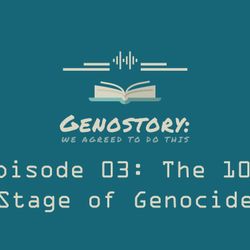
Ep. 1.03 The 10th Stage of Genocide
35:49|Join historian John Lestrange for episode 3 of Genostory: We Agreed to Do This. In this episode John will go over the 10th stage of genocide, denial. This final stage is a furtherance of the violence against marginalized groups and it is vital that we be able to recognize its various forms. Special thanks to the app Hatchful and MJ Bradley for designing and editing out logo. Show music is "Crusade - Heavy Industry by Kevin MacLeod (incompetech.com) Licensed under Creative Commons: By Attribution 4.0 License. Sources: Dr. Gregory H. Stanton, Genocide Watch. genocidewatch.com/ten-stages-of-genocide Israel Charny “Templates for Gross Denial of a Known Genocide: A Manual,” The Encyclopedia of Genocide, volume 1, page 168. 12 Ways to Deny Genocide. http://genocidewatch.net/genocide-2/12-ways-to-deny-genocide/ Richard J. Evans. Telling Lies About Hitler: The Holocaust, History and the David Irving Trial, Verso, 2002, p. 151. "David Irving jailed for Holocaust denial". The Guardian. London. 20 February 2006. theguardian.com/world/2006/feb/20/austria.thefarright Fagiolo, Nicoletta (April 7, 2015). "Rwanda's Untold Story. A commentary on the BBC Two documentary". La Tribune Franco-Rwandaise. Retrieved July 5, 2017. Rwanda MPs condemn BBC Untold Story programme on genocide. https://www.bbc.com/news/world-africa-29732242 Michael Shermer & Alex Grobman. Denying History: who Says the Holocaust Never Happened and why Do They Say It?, University of California Press, 2000. p. 106. Ziv, Stav (24 April 2015). "Why Scholars Say Armenian Genocide Was Genocide But Obama Won't". Newsweek. https://www.newsweek.com/why-scholars-say-armenian-genocide-was-genocide-obama-wont-325262 Brinkley, Joel (2011). Cambodia's Curse: The Modern History of a Troubled Land. Public Affairs. pp. 48–49 Robert Conquest Reflections on a Ravaged Century (2000), p. 96 Guenter Lewy (Fall 2005). "Revisiting the Armenian Genocide". Middle East Quarterly. https://www.meforum.org/748/revisiting-the-armenian-genocide Dadrian, Vahakn (November 1991). "The Documentation of the World War I Armenian Massacres in the Proceedings of the Turkish Military Tribunal". International Journal of Middle East Studies. 23 (4): 549–76 Soysal, Mumtaz (1985). The Orly Trial, 19 February – 2 March 1985, Statement and Evidence Presented at the Trial McCarthy, Justin. Death and Exile: The Ethnic Cleansing of Ottomon Muslims, 1821–1922. Officials Told to Avoid Calling Rwanda Killings ‘Genocide’ https://www.nytimes.com/1994/06/10/world/officials-told-to-avoid-calling-rwanda-killings-genocide.html Rwanda: No Conspiracy, No Genocide Planning… No Genocide? http://www.rwandadocumentsproject.net/gsdl/collect/arrest/index/assoc/HASHcb21.dir/pt3NoConspiracyNoPlanningNoGenocide.pdf Lemarchand, René (May 2013). "Scholarly Review: Rwanda: The State of Research". Online Encyclopedia of Mass Violence. Rozajać, Sanita (16 January 2008). "Europe Finds Interesting Trifunovic's Story about Islamic Terrorism". Oslobodjenje. The ADL Global 100 Survey https://global100.adl.org/map D D Guttenplan, Should Freedom of Speech Stop at Holocaust Denial? Archived January 15, 2008, at the Wayback Machine, Index of Free Expression, 2005. Laws against Holocaust Denial https://en.wikipedia.org/wiki/Laws_against_Holocaust_denial#By_country Chomsky, Noam (28...